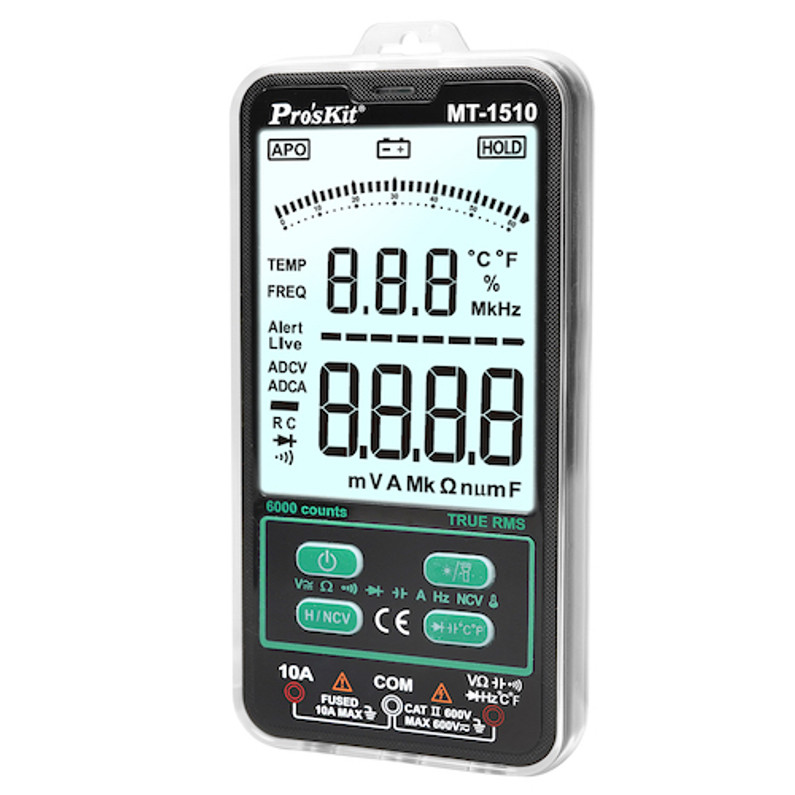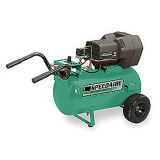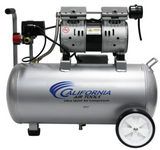Tool of the Week: Multimeters – The Must-Have Tool for Every Technician
When it comes to diagnosing and troubleshooting electrical systems, a multimeter is one tool every technician, electrician, and DIY enthusiast should have in their arsenal. Whether you're working on air compressors, household wiring, automotive systems, or HVAC units, a reliable multimeter can save time, increase safety, and ensure precise measurements.
What is a Multimeter?
A multimeter is a versatile device that combines several electrical measurement functions into one tool. It can measure:
- Voltage (V): Both AC and DC voltage, essential for determining if power is flowing correctly.
- Current (A): Helps measure the flow of electric charge in a circuit.
- Resistance (Ω): Useful for checking the integrity of circuits, ensuring no breaks or short circuits.
- Continuity: Verifies that a circuit is complete and operational.
Depending on the multimeter there can be numerous other test features such as:
- Frequency (Hz): The number of occurrences of a repeating event per unit of time.
- Capacitance (F): Capacity of a material object or device to store electric charge.
- Inductance (L): Ratio of the induced voltage to the rate of change of current causing it.
- Diode Test: Component that allows current to flow in one direction, acting as a one-way valve.
- Transistor Test (hFE): Indicates how effectively the transistor amplifies the input current.
- Temperature (°C/°F): Includes specific probes to read temperature on point of contact.
Key Uses of a Multimeter
- Troubleshooting Electrical Problems: Multimeters are used to detect issues in wiring, circuits, and electrical components. Whether your air compressor isn’t starting, or your wiring is malfunctioning, a multimeter helps pinpoint the problem by checking for voltage drops or breaks in the circuit.
- Measuring Battery Health: If you're unsure whether a battery is dead or just low on charge, a multimeter can quickly give you a voltage reading, letting you know if the battery needs replacing.
- Testing Continuity: When installing or repairing electrical components, checking for continuity ensures the circuit is complete. Multimeters help verify that there are no gaps or faulty connections in your wiring or system.
- Ensuring Electrical Safety: A multimeter allows you to safely measure live circuits without risking injury. With features like True-RMS and overload protection, they provide accurate and safe readings even on high-voltage systems, ensuring you know what you’re dealing with before working on live equipment.
Benefits of Owning a Multimeter
- Precision: Modern digital multimeters provide highly accurate readings for voltage, current, and resistance. This precision is critical when working on sensitive equipment like air compressors, power tools, and household electronics.
- Versatility: Whether you need to test voltage on a car battery, diagnose an issue in your HVAC system, or check the continuity of home electrical wiring, a multimeter can handle it all. Its broad range of functions makes it a must-have for various applications.
- Cost-Effective: For a relatively low price, multimeters offer a range of testing functions that would otherwise require multiple tools. This makes them a cost-effective solution for anyone who regularly works with electrical systems.
- Safety: Multimeters are designed with safety features like overload protection and insulated probes to minimize the risk of accidents when working with electricity. For professionals working with high-voltage systems or live circuits, this is especially important.
- Portable and Easy to Use: Most modern multimeters are lightweight and portable, making them easy to carry around job sites or keep handy in your toolbox. Many models also feature intuitive displays and simple controls, making them accessible to both professionals and beginners.
Why Every Technician Should Own a Multimeter
A multimeter is more than just a tool—it’s an essential safety device and a time-saver. By providing fast and accurate readings, it allows you to quickly diagnose and fix electrical issues, whether you're maintaining an air compressor, troubleshooting household appliances, or working on a car. From hobbyists to seasoned professionals, every technician should have a multimeter in their toolkit.
Get the Right Multimeter for the Job
At Master Tool Repair, we carry a range of multimeters to suit all your needs, from basic analog and digital models to advanced True-RMS meters. Whether you’re a beginner or an experienced electrician, we have the perfect multimeter for your workbench. Here are four we’d like to highlight:
- 3 5/6 True-RMS Digital Multimeter
- Protective Function Analog Multimeter
- 4-in-1 fiber Optical Power Multimeter
- 3-5/6 Digital Clamp-on Meter
Recent Posts
-
Oil-Bath vs. Oil-Free Air Compressors: Which One Is Right for You?
When it comes to choosing the right air compressor for your needs, one of the most common questions …Dec 20, 2024 -
California Air Tools 8010: The Ultra-Quiet, Oil-Free Air Compressor You’ve Been Looking For
If you’ve ever been frustrated by the ear-splitting noise of traditional air compressors or the main …Dec 12, 2024 -
Trouble-Shooting a Safety Relief Valve
The Safety Relief (or Release) Valve is probably the most important item on your air compressor...i …Dec 12, 2024




